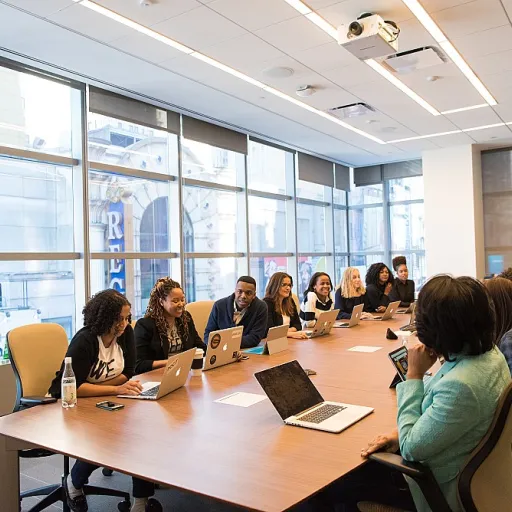
Understanding Company Culture
Delving into Company Values and Vision
Understanding the culture of a company can significantly influence your career path and professional satisfaction. During your interview, it's crucial to ask questions that reveal insights about the company's values and how they align with your professional goals.- Describe the company's core values. This question helps you understand what drives the company’s operations and decision-making processes. It can also offer a glimpse into how these values impact employee recognition and performance management.
- How do employees embody the company culture? Insightful questions like this can provide a realistic view of daily life within the company and reveal whether the culture genuinely supports its stated values.
- Can you discuss how the company supports professional development? Asking about professional development opportunities is essential to gauge if the company values growth and learning, pivotal for a satisfying career.
Evaluating Growth Opportunities
Assessing Professional Development and Growth Prospects
The evolution of one's career is often as important as the position and its current job description. During interview discussions, candidate questions surrounding growth opportunities can offer insightful revelations about what the company truly values in terms of employee development. It's essential to understand what pathways exist for advancing your professional skills and what performance management metrics are in place.
Consider posing questions that explore the structure of the company’s career progression. Ask the hiring manager how the organization supports continuous learning and development for its team. Identifying whether they have recognition programs and employee recognition systems can give you clues about how they rate and reward success.
- "Can you describe the opportunities for growth within the role and the company?"
- "What professional development resources are available for employees?"
- "How does the company culture support ongoing learning and skill enhancement?"
By asking these questions, you demonstrate foresight and commitment to your professional trajectory. Moreover, it conveys your understanding of how important a supportive work environment is for personal and career growth. Additionally, exploring the various types of employment in HR tech may also provide context on different career paths available within the industry.
Clarifying Job Responsibilities
Defining the Boundaries of Your Role
Understanding the specific responsibilities of a job is crucial to ensure that you and your potential employer are on the same page during the interview process. Clarity in job responsibilities not only helps you gauge whether the position aligns with your career goals, but also sets expectations for performance evaluations and potential career advancement. Here are some insightful questions to ask during your job interview:- Can you describe the day-to-day tasks associated with this role?
This question allows the hiring manager to outline what a typical day might look like. Understanding these details helps you assess whether the role matches your skills and interests. - How does this position contribute to the company’s goals?
Sourcing information about how the role fits into the bigger picture of the company’s objectives can help you appreciate its impact and importance, as well as guide your performance management. - What are the professional development opportunities for this role?
Asking about growth and development opportunities shows that you’re committed to your career progression and interested in acquiring new skills that benefit both you and the company. - Are there any duties not listed in the job description that I should be aware of?
Sometimes, job descriptions only scratch the surface. Clarifying unlisted responsibilities ensures there are no surprises once you start working. - How do you evaluate success in this position?
Knowing how your performance will be measured helps you understand what the company values and how you can meet those expectations effectively.
Assessing Work-Life Balance
Balancing Act: Work and Life
When considering a new position, understanding the role's impact on one's personal life is crucial. During an interview, insightful questions about work-life balance can provide clarity on what to expect. This extends beyond just the number of hours worked; it's also about the company's culture and how it promotes employee well-being. For instance, some companies offer flexible work arrangements, which can make a significant difference in balancing professional and personal responsibilities. Asking about the options for remote work or adaptable schedules can provide a sense of the company's attitude toward accommodating employee needs. Moreover, discussing recognition programs and employee acknowledgment during interviews can reveal how the company values contributions and maintains morale. Are there performance management systems in place that not only drive productivity but also recognize hard work? Understanding this aspect can elucidate how the company ensures employees are not overwhelmed and feel appreciated timely. During the interview, probing into how the hiring manager defines success for the role can also indicate the balance between work output and personal life. If a position requires frequent overtime or intense travel, it might impact one's lifestyle significantly. Thus, questions about expectations, evaluation criteria, and performance reviews are essential for a deeper insight. In sum, by addressing potential work-life balance issues in the job interview, such as discussing how the company supports its employees, individuals can gain a clearer perspective on whether the role aligns with their career and life goals.Investigating Management Style
Delving into Leadership and Management Styles
One of the key factors that can greatly influence your experience in a new role is the leadership and management style of the company. During the interview, it's vital to gain an understanding of how employees are guided and supported by their leaders and managers. This can reveal a lot about the company's culture and overall work environment.
While discussing company culture, consider asking questions about the management structure to understand what type of leadership you might work under:
- "Can you describe the management style of the team or department I'd be joining?"
- "How does the company approach performance management and employee development?"
- "What sort of recognition programs or professional development opportunities does the company offer?"
These interview questions will not only give you insights into the company culture but also demonstrate your interest in working in an environment where you can thrive professionally. Moreover, recognizing the management style can help you align your career goals with the organization's values, ensuring a satisfying job role.
Ultimately, these questions during the interview will provide clarity about whether the company’s approach to leadership aligns with your aspirations and if it’s conducive for building a fruitful career path in your position.













